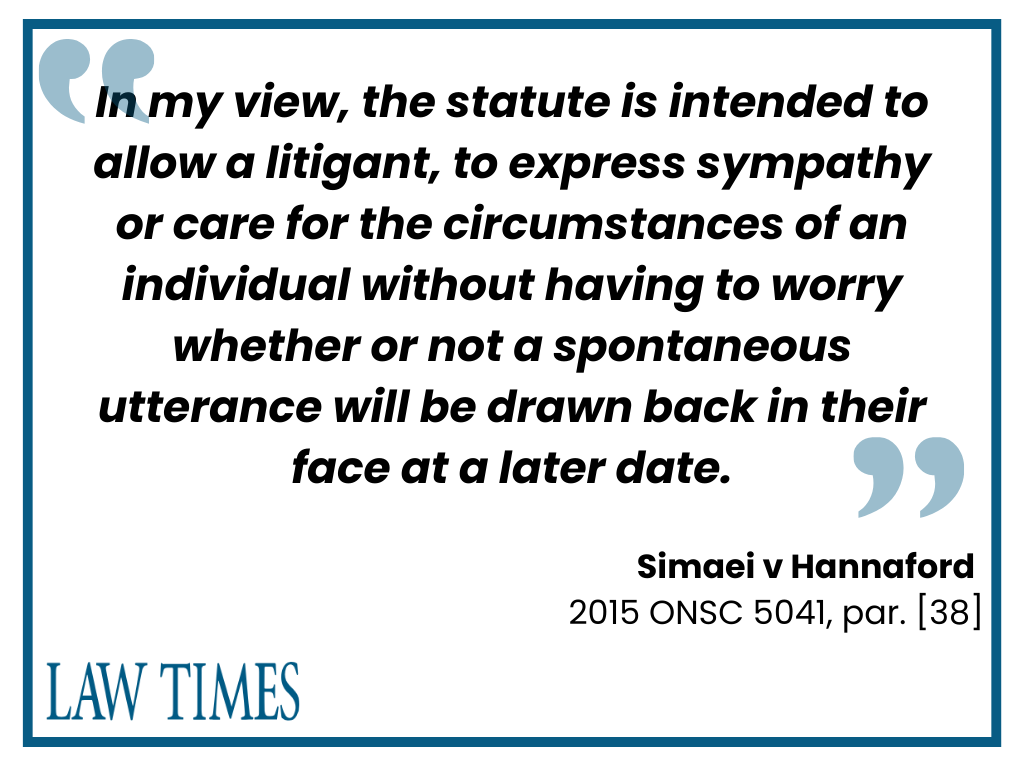
Can apologies by defendants be taken against them in court? The answer lies in understanding the Apology Act, such as when and how it applies

When an injurious act happens, the immediate response by some alleged defendants would be to offer a simple apology. But would this be prejudicial to them when facing the plaintiff in court? In any case, would it even be too late for them to say sorry?
This article discusses the effects of Ontario’s Apology Act, including case law, which may have a thing or two to say about defendants when saying their sorry. Aside from being written for lawyers, this article can be used for clients as an educational piece.
Most Canadian provinces have their own laws on sorry or apology legislations. These laws govern apologies made outside the court and their effects on the liability of the defendant when a case is filed against them. In Ontario, this would be the Apology Act, 2009, which came into force on April 23, 2009. This provincial apology statute tells us about:
Darryl Singer, a Toronto area litigation lawyer and principal of Singer Barristers PC, gave some insights into this provincial law on apology: “The aim of the Act was to allow a potential defendant to express remorse or regret without fear of such comments precluding a defence on the merits and with no impact on a determination of liability. The legislature thought it might encourage emotional bridge building between aggrieved parties that could have the positive effect of either preventing or circumscribing litigation.”
Here’s a short video that summarizes how an apology legislation in Canada applies:
Lawyers and clients alike can consult those who are in the field of personal injury when involved in a case concerning provincial apology legislation. For this, one of our sister publications, Canadian Lawyer Magazine, has a Special Report on Canada’s Best Personal Injury Law Firms.
At its very core, the Apology Act in Ontario limits the admissibility of a defendant’s apology as evidence against them in a civil action. As such, an apology is not an admission of guilt or fault on the part of the defendant.
Aside from protecting the value of apologizing, the law implies that a defendant’s liability must be established in ways other than their mere saying of sorry. However, we’ll later learn that there are exceptions to this protection established by the Act.
As used by Ontario’s Apology Act, an “apology” can either be:
In connection with the matter to which the apologetic words or actions are related, it’s considered an apology if:
An apology may also be attributed to the defendant when it’s made on their behalf.
The Apology Act provides that, on the part of the person apologizing, their apology:
is not an expressed or implied admission of their fault or liability
This apology legislation of Ontario further states that, when proving the fault or liability of the person who apologized, any evidence of an apology made is inadmissible in the following proceedings:
Apologies are usually blurted out after accidents happen, such as a car accident. Everyone can benefit when they know what they should or should not do when they’re hit (or when they hit someone). More about what to do during vehicular accidents in this video:
For more information on what to do before or after a car accident, consulting a personal injury lawyer would be the best thing to do. Lexpert, another sister publication of ours, has a directory of the best personal injury lawyers in Ontario to reach out to.
With all the protections afforded by these apology legislations, they still come with limitations. Under the Ontario’s apology law, the inadmissibility of an apology does not apply to:
This means that the apology statute only applies to civil cases, such as personal injury lawsuits, whether it be in a court or an arbitration proceeding. Other than that, apologies may be used against the person offering them.
Another limitation of the Act’s applicability is that it does not affect the acknowledgments made under Ontario’s Limitations Act, 2002. For the Limitations Act, an injurious act or omission shall be deemed to have taken place on the day that the acknowledgment of liability has been made. Applying the Apology Act’s provisions:
acknowledgments are not affected whether an apology is also an acknowledgment of liability
There have been previous and recent cases in Ontario that applied the Apology Act. These cases provide clearer interpretations of the law, guiding both lawyers and clients in litigations, such as in personal injury cases.
Singer highlighted the case of Simaei v. Hannaford, 2015 ONSC 5041, as written by Master Donald Short. This case raises an interesting advocacy opportunity based on this Ontario apology legislation.
The plaintiff in Simaei wished to plead in her statement of claim her former employer’s apology. This arose from the termination of her employment, which she wants to use as an admission of fault or wrongdoing. As such, the plaintiff wished to use the apology as a quiver in the arrow of her case.
However, the defendant’s lawyers argued the court should strike that part of the statement of claim as being prejudicial to her in addition to being vexatious and an abuse of process. None of the allegations have been proven in court.
The court agreed. It cited the provisions of the Apology Act that mandate that a party cannot use an apology made in good faith against the other side in the context of the litigation. An exception to this is when the apology is made in the context of an on-the-record discussion as part of the litigation.
The court went even further. It suggested that the court must by necessity strike the portion of the pleading referring to the apology since a party, under the Rules of Civil Procedure, “cannot plead facts that go nowhere.”
Under Ontario’s apology law, pleading the apology goes nowhere because the provisions state that a party cannot use the apology in the litigation as an admission of liability. Further, the trier of fact cannot consider it in any determination of fault. Thus, even pleading the fact that there was an apology by the defendant offends the principles of pleading and potentially prejudices the defendant at the trial. Additionally, if the apology remains a part of the pleading, it becomes a live issue on discovery.

While Simaei, on its face, appears to provide some practical advice on the principles of pleading, its discussion of the Apology Act is the real lesson that lawyers can draw from. Specifically, the Act essentially allows a client in any potential civil case, where a putative plaintiff feels aggrieved or possesses a level of moral superiority, to strategically issue an apology in an attempt to diffuse the situation.
Short, in obiter, underscored the virtue of a strategic apology when he noted: “My personal involvement in mediation, arbitration has provided me with examples of the value of an apology in reaching a mutually acceptable out-of-court resolution.”
Singer concurs with Short. In his own experiences over 22 years of litigation, he said that a properly timed and genuine expression of remorse can:
“As lawyers, we think of the facts of a potential case in emotionally detached and almost clinical terms. But to the clients sitting in front of us, if we listen closely, mixed with their explanations of how they suffered economic losses by the proposed defendant will be expressions of moral indignation about how someone could do something so bad to them.”
Settling or avoiding lawsuits involves understanding more than just the law, he added. “It involves trying to get inside the head of the opposing party to empathize with its perspective. Plaintiffs often just want someone to hear and understand them.”
As counsel for a potential defendant or for you if you are dealing with an unsatisfied client, Short reminds us that the Apology Act gives us a very useful tool, Singer said. “Used effectively and, most importantly, with authenticity and compassion, an apology may save thousands of dollars. It did not have that effect for the defendant in Simaei, but the plaintiff will not be able to use an ostensibly heartfelt expression of regret against her in the civil action.”
The Pollard Windows case: when the Apology Act does not apply
For all its protection of apologies made by defendants in civil cases, there are times when the Apology Act does not apply. An illustration of the Act’s exceptions is the case of Pollard Windows Inc. v 1736106 Ontario Inc., 2019 ONSC 4859.
The apology in this case was submitted by the counsel on behalf of the defendant corporation during appeal. The issue then revolved around whether the submission of the counsel can bind the defendant and if it can be withdrawn.
As held by the court, the Act does not apply to the defendant in this case; it means that their apology was not a protected one. It highlighted the provision of the Act which says that apologies made under oath in legal proceedings are exempted. Here, the admission offered by the counsel before the court was considered as an apology — and a proxy in place of his client’s testimony.
To add, the court said that since the admission and apology were given formally and advisedly, it cannot be withdrawn anymore. The factors considered by the court are, namely, that the Apology Act does not:
In this case, the defendant-corporation offered the admission and apology after it was already found to be liable in order to mitigate their sentence. As an effect, this cannot be withdrawn anymore and can now be used against the defendant corporation.
The Pollard Windows case tells us that counsels should be able to know the scope of the provincial apology legislation and its effects on their clients. In this case, even if the apology was made in the hopes of mitigating the sentence against the defendant, it backfired and was used against them.
It’s also worth noting the kinds of proceedings that these laws apply to. For instance, an apology legislation generally applies to most proceedings (as mentioned above). However, when it’s made during the said proceeding — such as the admission and apology that were given solemnly in this case — then it can be used against the defendant.
In a field of law where there’s a high chance of hostility, the Apology Act allows individuals to express genuine regret without the fear of legal consequences. It then opens reconciliation and understanding between parties in civil cases, which can be the best outcome in some circumstances. But as always, it’s important to first consult with a lawyer before clients say words of sorry to the people they’ve injured. For some, it may not be really too late to say sorry.
Bookmark our Personal Injury page for other articles and updates on personal injury case law, aside from those about the Apology Act of Ontario.